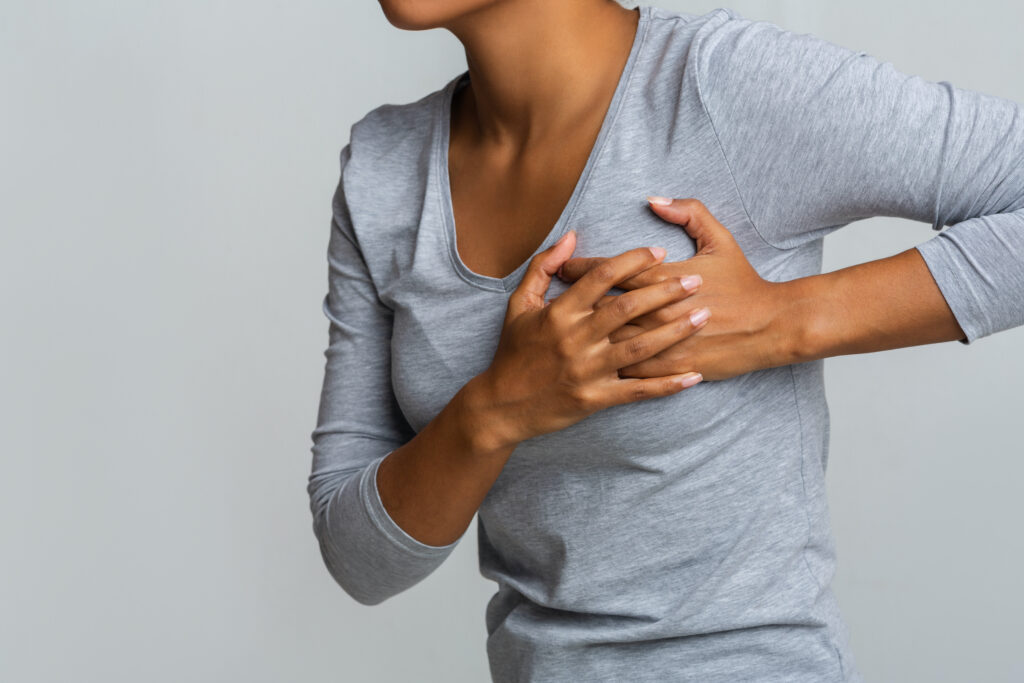Most of the time, when women experience breast pain, they tend to associate it with a cancerous breast condition. However, breast pain is very common in women and read on if you want to know more about its causes.
Hormonal Changes
 Hormones like progesterone and estrogen are crucial to a women’s health. They play a crucial role in their daily functions as well as important life milestones. From blood pressure and blood sugar to growth and fertility, hormones can affect everything in a woman’s body. While hormones can help regulate bodily functions and maintain general health, a hormonal imbalance –when there is too little or too much of a hormone in the blood –can bring along several health problems.
Hormones like progesterone and estrogen are crucial to a women’s health. They play a crucial role in their daily functions as well as important life milestones. From blood pressure and blood sugar to growth and fertility, hormones can affect everything in a woman’s body. While hormones can help regulate bodily functions and maintain general health, a hormonal imbalance –when there is too little or too much of a hormone in the blood –can bring along several health problems.
Women often experience hormonal fluctuations at predictable and naturally occurring points in their lives. For example, their levels of hormones can naturally fluctuate during pregnancy, the menstrual cycle and menopause. The change in hormone levels can then result in tender or swollen breasts.
Pregnant women, for example, experience sudden and dramatic fluctuations in their hormone levels during their first trimester and that’s when their breasts become heavier and denser. In fact, breast soreness is one of the earliest signs of pregnancy.
Hormonal changes during the three to five days prior to the beginning of a menstrual period may also lead to breast tenderness. The rise in estrogen and progesterone before your period can cause your breasts to swell and this breast pain is commonly known as cyclic breast pain. Cyclic breast pain is linked to hormonal changes during the menstrual cycle and is part of a set of symptoms that occur right before a period. The set of symptoms is known as premenstrual syndrome (PMS) and includes the following:
- Breast pain
- Acne
- Mood swings
- Tiredness
- Trouble sleeping
- Bloating
- Constipation or diarrhea
Since PMS is temporary, breast pain will go away several days after a period begins. However, if you still want to treat the symptoms, you can take over-the-counter (OTC) pain relievers or use gentle heat to soothe the pain.
You’ve Been Wearing an Unsupportive Bra
 Over the last five years, the trend of going bra-less has been growing in popularity. While many women “savor” at the idea of going bra-less 24/7, this could actually be bad news for your boobs.
Over the last five years, the trend of going bra-less has been growing in popularity. While many women “savor” at the idea of going bra-less 24/7, this could actually be bad news for your boobs.
Wearing a bra is an essential part of every woman’s life. Breasts may sit on top of your pecs, but they are heavy and since they are made up of glandular tissue and fat, they contain no muscles. So, when you wear a bra, the form-fitting undergarment can support and elevate your breasts. However, wearing the wrong size or unsupportive bra can make your breast tissue stretch and become saggy.
Several studies have shown that an ill-fitting bra can often lead to breast pain. It has also been reported that wearing the wrong size bra can also lead to breast skin damage. We also see that ill-fitting bras have been linked with bad posture, neck, back and shoulder pain.
Sometimes, women choose the wrong sports bra and by the end of the day, they end up with achy and sore breasts.
Today, there are several department stores where you can find a free bra fitting to find the right size of bra. Experts also stretch the importance of buying and wearing supportive, non-wired and comfortable bras during critical life stages like menopause and pregnancy.
A Medication Side Effect
 Medication comes with two types of effects: the good and desirable effects and the unwanted effects. The unwanted and unexpected effect of a medicine is commonly known as side effects.
Medication comes with two types of effects: the good and desirable effects and the unwanted effects. The unwanted and unexpected effect of a medicine is commonly known as side effects.
Unknowingly, you might be taking a medication whose side effect is breast pain. So, here are some drugs known for this side effect:
- Oxymetholone –used to treat anemia
- Methyldopa –used for high blood pressure
- Digitalis – used to strengthen contradictions of the heart
- Chlorpromazine – used to treat several mental disorders
- Water pills- used to treat kidney and heart diseases
- Hormone therapies


